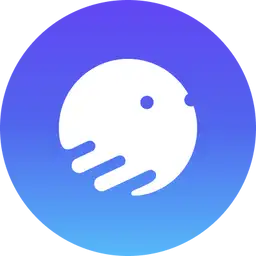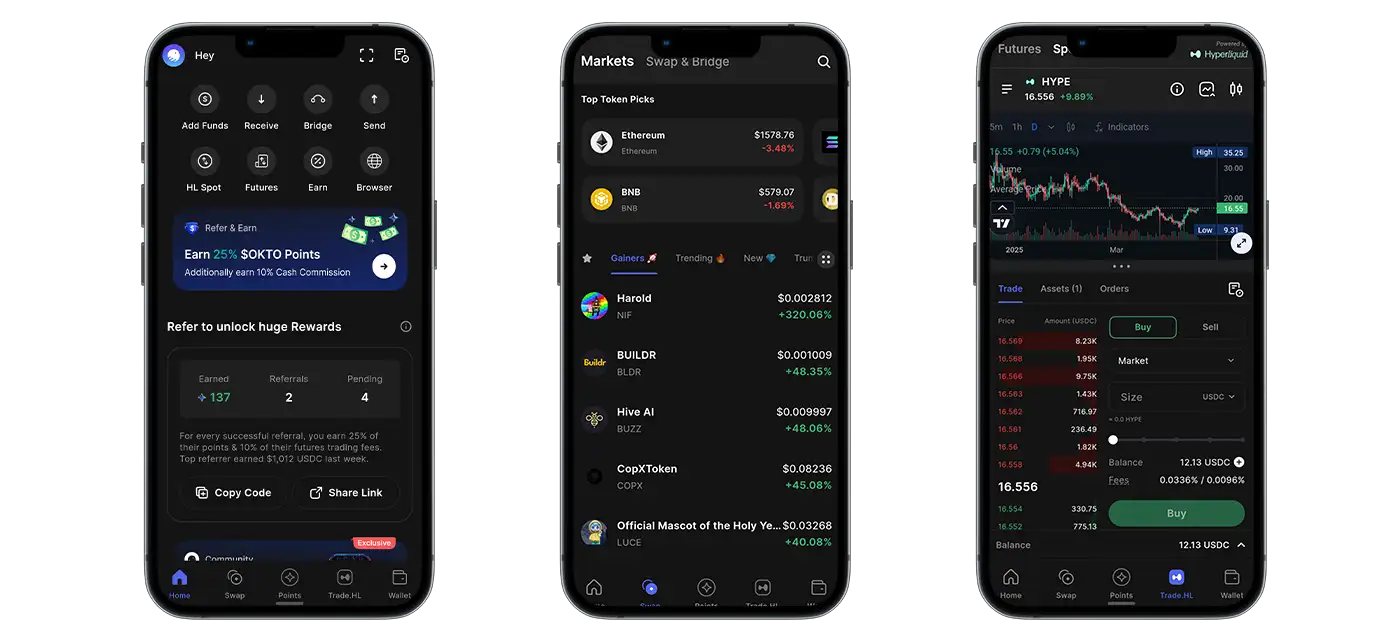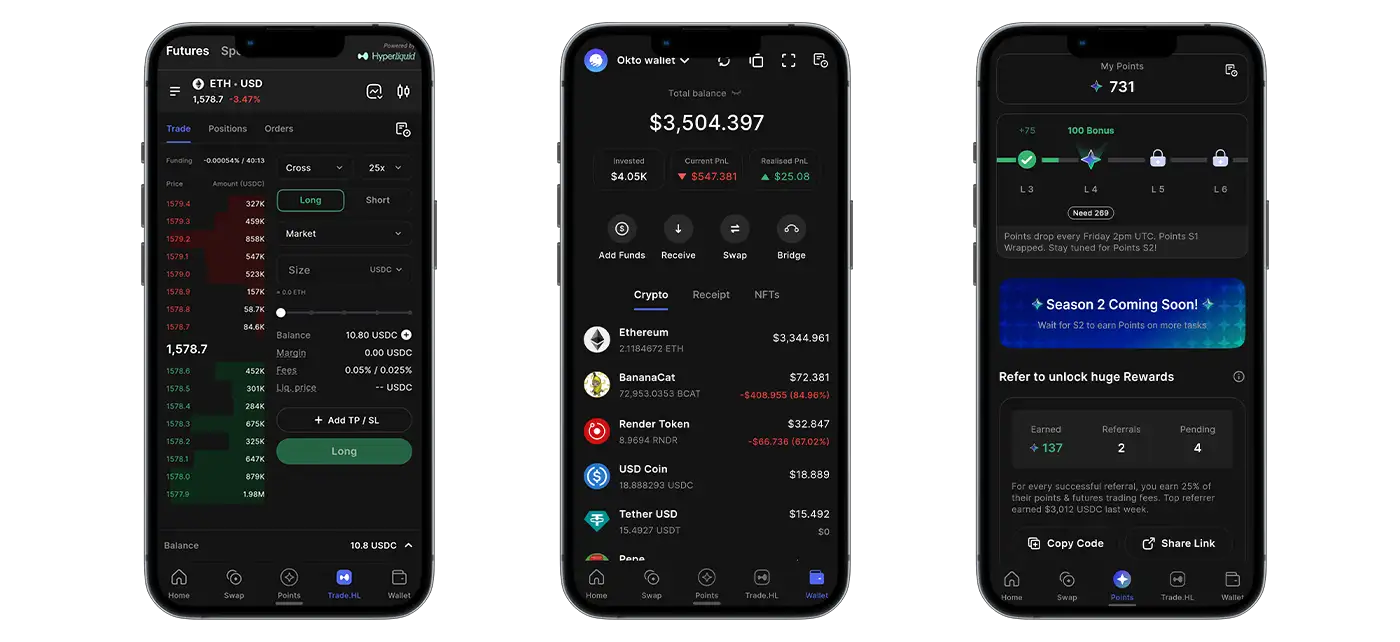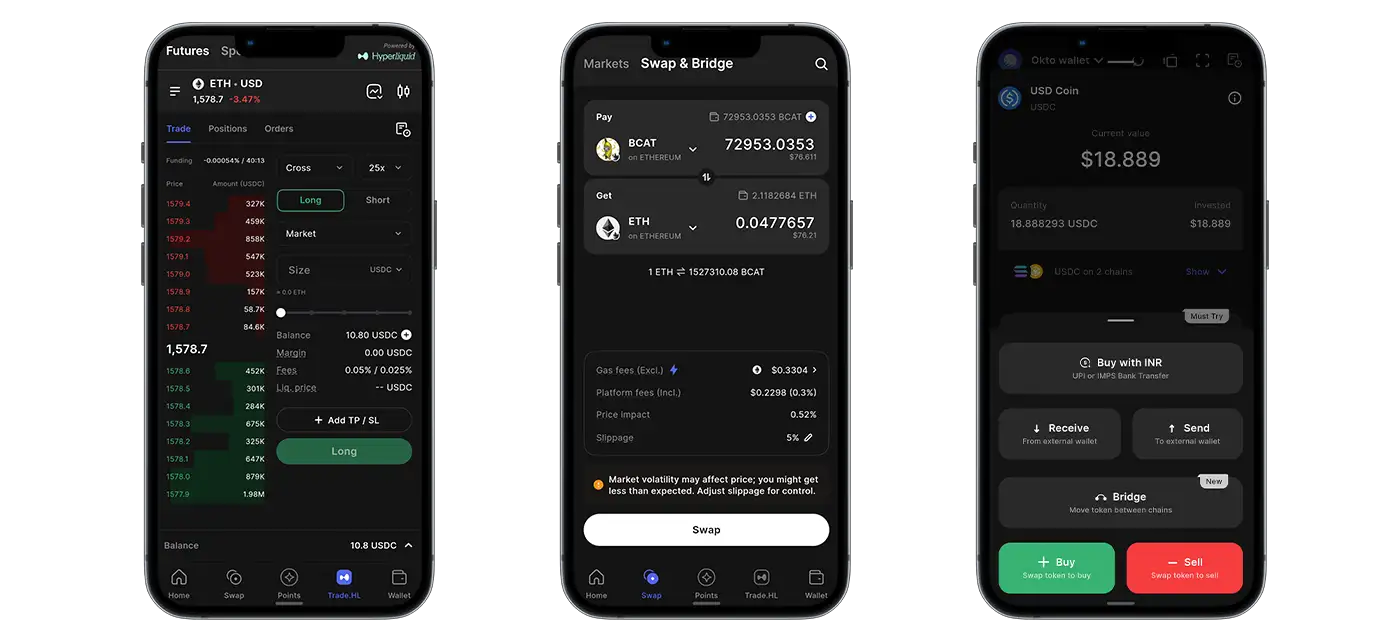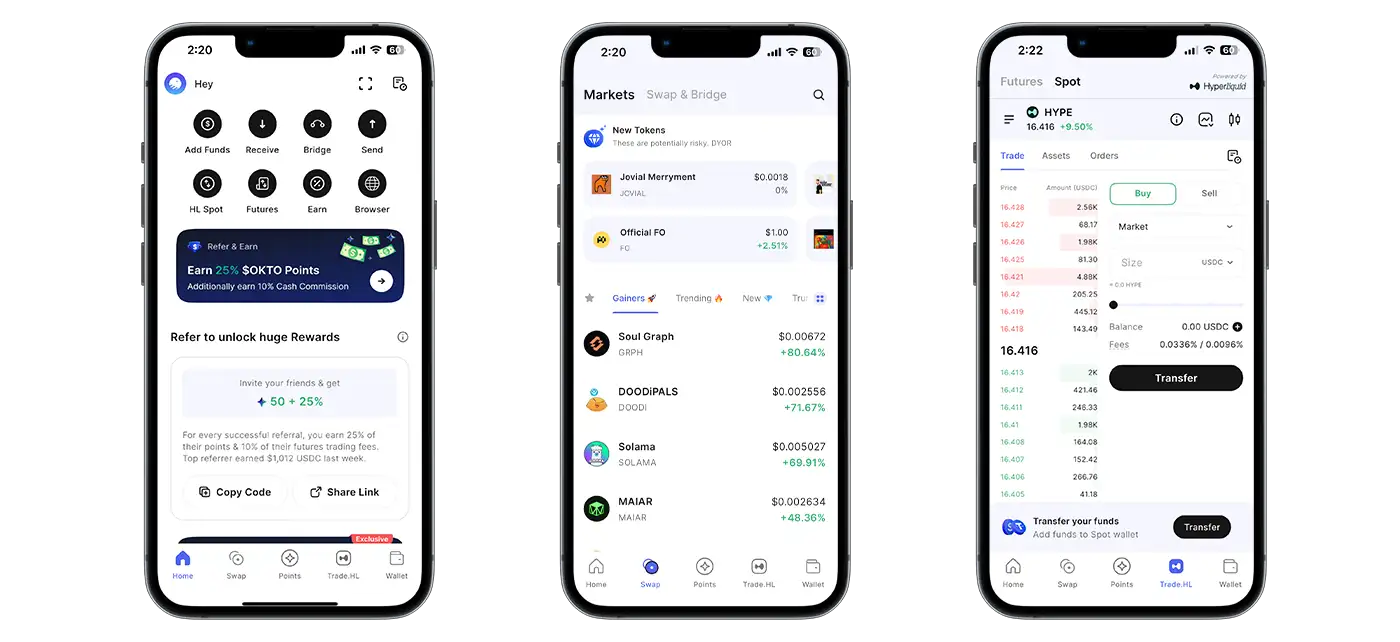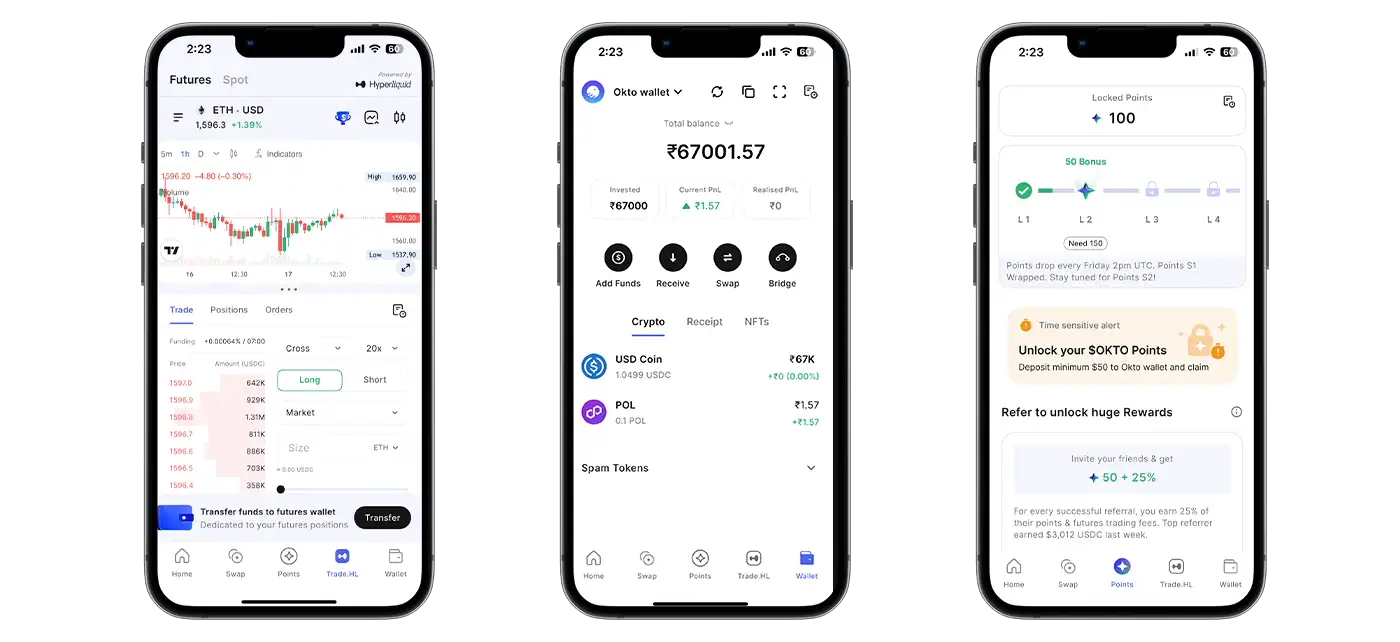About Okto Wallet
Okto Wallet is a next-generation chain abstraction platform that reimagines how users and developers interact with the blockchain. By simplifying the complexities of multi-chain environments, Okto provides an end-to-end infrastructure that makes Web3 experiences as intuitive and seamless as traditional Web2 applications. Its powerful toolset is designed to empower users with smart wallets, zero-gas transactions, and one-click cross-chain trading.
At the heart of Okto is a clear mission: bring the globe onchain. Whether through the Okto Wallet for individuals or the Okto SDK for developers, the platform eliminates barriers to adoption and enables rich, unified experiences across ecosystems like Ethereum, Solana, Aptos, and Cosmos. With over 12 million wallets created and a growing network of partners and developers, Okto is rapidly becoming the standard for multichain interaction.
Okto was created to solve one of the biggest problems facing Web3: fragmentation. From wallets and gas fees to bridging and liquidity, interacting with blockchain technology is still overly technical for the average user and complex for developers. Okto addresses this through a unified orchestration layer that abstracts the blockchain's technical layers—chain, wallet, transaction, data, and liquidity.
The Okto Wallet is a DeFi super app enabling gasless, cross-chain trades with a user experience rivaling centralized apps. It supports 1-click swaps across 30+ chains, decentralized derivatives trading via Hyperliquid, social login-based self-custody, and secure Multi-Party Computation (MPC) wallets. Whether a user is trading, earning, or exploring airdrop opportunities, Okto delivers a secure and simple experience.
On the developer side, the Okto SDK provides a plug-and-play toolset to build cross-chain applications with Web2-level simplicity. Features like embedded wallets, intent-based transaction orchestration, and delegated signing allow developers to build robust apps without handling complex blockchain operations. The SDK supports multiple languages and frameworks like React, Flutter, and Unity, making it accessible across the development spectrum.
Additionally, the platform is built with modularity and decentralization in mind. Its components include the Okto App Chain (an orchestration layer), Decentralized Transaction Networks (DTNs) for async multi-chain operations, and Decentralized Wallet Networks (DWNs) for secure session-based wallet control. Combined, these allow apps to execute powerful multi-step flows—like swaps, staking, NFT creation—through simple API calls.
While other platforms like Biconomy, Zerion, and Sequence offer elements of abstraction or wallet management, Okto delivers a full-stack solution from wallet to liquidity routing. With its comprehensive toolkit and expanding ecosystem, Okto is poised to be the infrastructure layer for the next billion Web3 users.
Okto provides numerous benefits and features that redefine how users and developers experience Web3:
- Chain Abstraction: Work across Ethereum, Solana, Cosmos, Aptos, and more chains using a unified interface—no need to manage chain-specific operations.
- Gasless Transactions: Users can transact without holding native gas tokens; fees can be paid in stablecoins or abstracted entirely.
- Cross-Chain Swaps: One-click swaps between any tokens across supported chains with optimal routing and bridgeless execution.
- Embedded Wallet SDK: Integrate MPC wallets into your dApp within a day and onboard users via email, SMS, or social login.
- Delegated Signing: Smart session-based wallet control enables multi-hop transactions securely through permission-based signing.
- Real-Time Data & Indexing: Access live blockchain data feeds across chains to enhance analytics and user experience.
- Developer Incentives: Builders can earn $OKTO by deploying new Blocs to the Bloc Hub, creating reusable transaction flows for others.
Getting started with Okto is easy for both users and developers:
- Step 1 – Explore the Website: Visit okto.tech to learn about their wallet and SDK offerings.
- Step 2 – Download the App: Access the Okto Wallet on iOS and Android to start trading and managing assets instantly.
- Step 3 – Sign Up Seamlessly: Use social login (Google, Apple, etc.) for a frictionless wallet experience—no seed phrases required.
- Step 4 – Start Trading or Earning: Swap assets, earn yield, or explore airdrop campaigns directly from the mobile wallet.
- Step 5 – Developers – Integrate SDK: Use the Okto SDK to integrate wallet, transaction, and liquidity abstraction into your app.
- Step 6 – Join the Community: Apply for developer grants or earn Okto Points by contributing to the ecosystem and building with Blocs.
Okto Wallet Reviews by Real Users
Okto Wallet FAQ
Okto utilizes its proprietary Unified Liquidity Layer (ULL) and Decentralized Transaction Networks (DTNs) to perform any-to-any cross-chain swaps without exposing the user to bridges. Instead of the user interacting with bridges directly, Okto automates asset routing and settlement in the backend using a network of decentralized nodes. These nodes identify the optimal route and execute multi-hop swaps invisibly—delivering the final token to the user's wallet with a single click.
Okto Wallet replaces seed phrases and chain juggling with social logins, session-based permissions, and MPC key management. Unlike MetaMask or other custodial wallets, Okto offers decentralized self-custody through the Decentralized Wallet Network (DWN), allowing users to authorize apps with fine-grained permissions and never expose private keys. This delivers a Web2-like user experience without compromising on Web3 principles like security and control.
Developers can use the Bloc SDK to build programmable scripts called Blocs for use cases like swaps, NFT minting, or staking across multiple chains. Once deployed to the Bloc Hub, these Blocs become accessible via API to other apps built on Okto. Developers are incentivized with $OKTO tokens based on usage and adoption, allowing them to monetize innovation while reducing their dev cycles by over 90% through abstraction.
Blocs are modular, composable scripts that represent complex multi-step blockchain actions. For example, a Bloc can represent minting an NFT, executing a cross-chain swap, or consolidating assets for staking. Okto abstracts these into simple API calls for developers and one-click operations for users. The Bloc system enables reusability, on-chain verification, and decentralized execution, cutting through the complexity of traditional dApp development.
Gasless transactions on Okto are enabled through a cross-ecosystem Gas Station Network (GSN) and paid via tokens held by the user or the app. These fees are abstracted away from the user experience and handled in real time. Security is preserved through MPC wallets managed by decentralized actors in the DWN, which sign only on permissioned sessions. Validator nodes and ZK-proof mechanisms ensure tamper-resistance while preserving Web3's core principle of decentralization.
You Might Also Like









